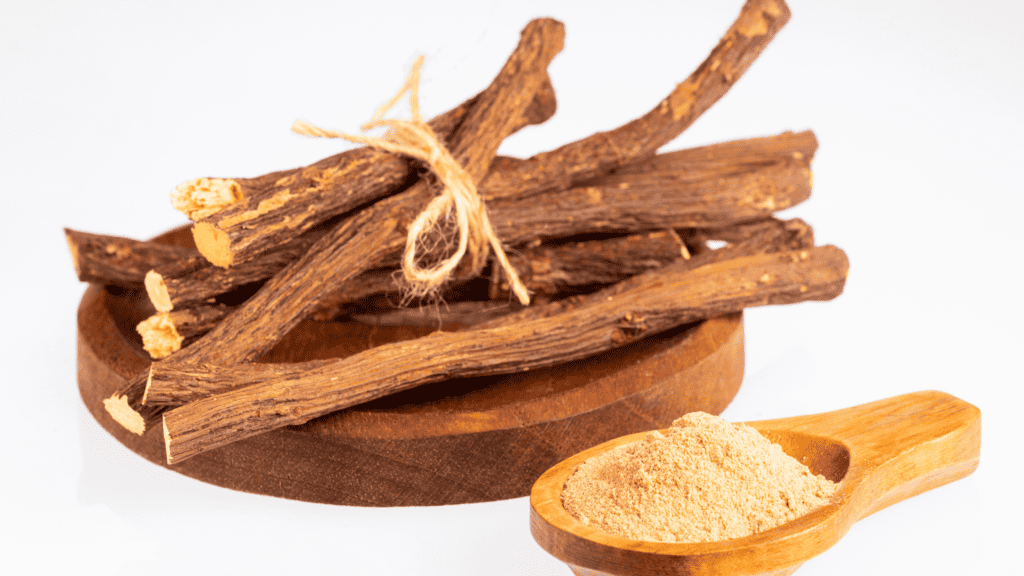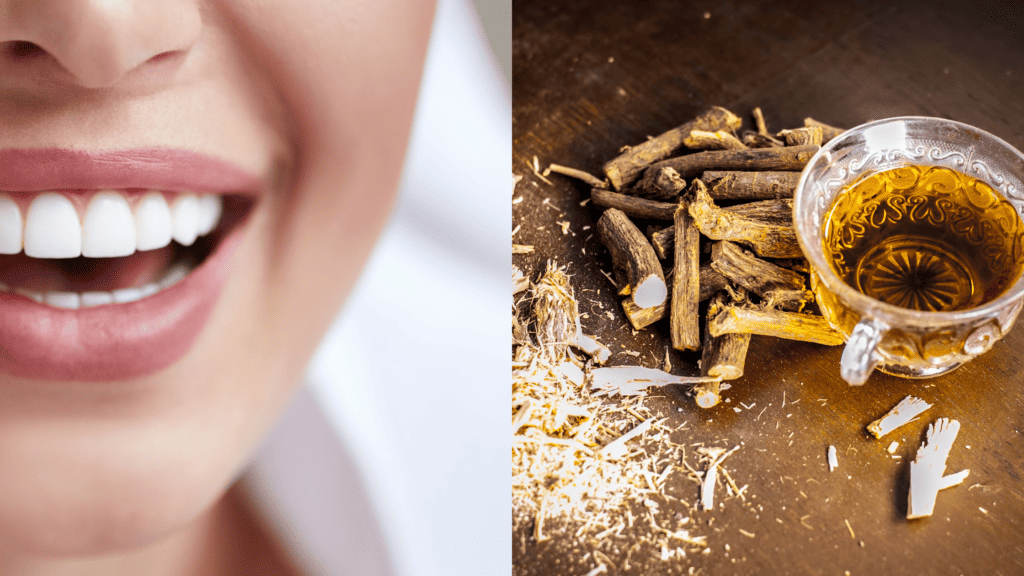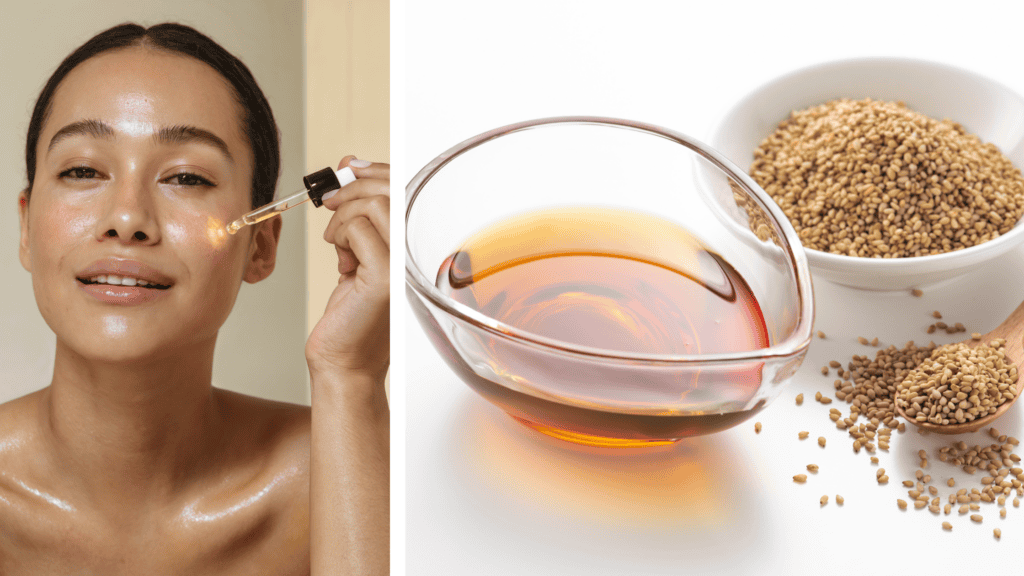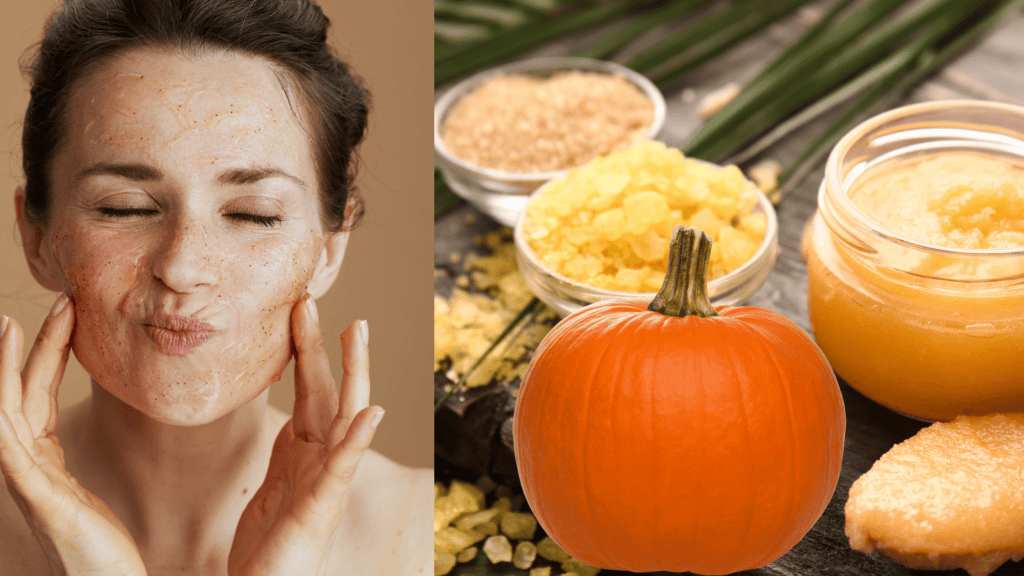Ayurveda has much to teach about a holistic approach to beauty and wellness. It contains ancient wisdom that seems increasingly relevant in our fast-paced world, leaving many burnt out. If you are looking for more natural approaches to caring for your teeth, you may have encountered Ayurvedic practices.
One beneficial ingredient in Ayurveda oral care is licorice! If you’re a fan of licorice candy, you’ll be happy to know that this sweet treat in its natural form is not only delicious but has remarkable properties that can promote oral health!
What Is Licorice?
Licorice, scientifically known as Glycyrrhiza glabra, is a flowering plant native to Europe and Asia. It has been used for centuries in Ayurvedic medicine due to its numerous health benefits. In Ayurveda, licorice is known as “yashtimadhu,” which translates to “sweet root.” This sweet root is significant in Ayurveda, particularly in oral care practices.
Licorice has a rich historical background in oral care. In ancient times, licorice root was chewed to maintain oral hygiene and freshen breath. The root was also used to alleviate toothaches and soothe gum inflammation. The traditional use of licorice in Ayurveda oral care has paved the way for modern scientific research, which has shed light on its potential benefits.
Licorice contains several active compounds that contribute to its beneficial properties. The most notable combination is glycyrrhizin, which provides the characteristic sweetness and is responsible for many of its therapeutic effects. Glycyrrhizin has been found to possess anti-inflammatory, antimicrobial, and antioxidant properties, making it valuable in maintaining oral health.

The Benefits Of Licorice For Healthy Teeth And Gums!
Promotes Healthy Teeth and Gums
Licorice is known for combating common oral issues such as tooth decay, cavities, and gum diseases. The antimicrobial properties of licorice help inhibit the growth of bacteria that contribute to these problems. Studies have shown that licorice extract effectively reduces the activity of Streptococcus mutans, the primary bacteria responsible for tooth decay.
In addition to its antimicrobial properties, licorice also possesses anti-adhesive properties. This means that it can prevent bacteria from adhering to the teeth, reducing the formation of plaque and tartar. By lessening plaque build-up, licorice helps prevent the development of cavities and gum diseases, promoting overall oral health.
Research-backed evidence supports the use of licorice in oral care. A study published in the Journal of the Indian Society of Periodontology found that licorice mouthwash significantly reduced plaque and gum inflammation in participants.
Another study published in the Journal of Clinical Periodontology showed that licorice extract effectively inhibited the growth of periodontal pathogens. These findings highlight the potential of licorice as a natural and effective solution for maintaining healthy teeth and gums.
Soothes Oral Health Problems.
Licorice has a soothing effect on oral health problems, including mouth ulcers and canker sores. Its anti-inflammatory properties help reduce pain and inflammation in the mouth. Applying a licorice gel or mouthwash topically can provide relief and promote the healing process.
Licorice contains compounds called flavonoids, which have been found to accelerate wound healing. These flavonoids aid in regenerating damaged tissues, allowing mouth ulcers or canker sores to heal more quickly. By soothing these oral health problems, licorice provides comfort and promotes overall oral well-being.
Natural Breath Freshener:
One of licorice’s benefits is its ability to act as a natural breath freshener. Bad breath, scientifically known as halitosis, can stem from various factors, including bacteria in the mouth. Licorice, with its antimicrobial properties, helps eliminate the bacteria responsible for causing bad breath.
Licorice has a sweet and refreshing taste that leaves a pleasant aftertaste. Chewing on licorice root or using licorice-based mouthwash can help maintain oral freshness throughout the day. If you want a natural solution to bad breath, free of artificial breath freshener, try licorice for a more natural and effective solution.
How To Use Licorice In Your Oral Care Routine!
Now that you know the incredible benefits of licorice in Ayurveda oral care, you might wonder how to add it to your daily routine. Luckily, there are several practical ways to benefit from the power of licorice for optimal oral health.
Licorice Root.
One simple method is to chew on licorice root. You can find licorice roots in health food stores or online. Chewing on licorice root not only freshens breath but also allows the beneficial compounds to come into contact with the teeth and gums.
Another option is to make a licorice mouthwash or toothpaste at home. Here’s a simple recipe for a licorice mouthwash.

Licorice Mouth Wash Recipe!
- Boil one cup of water and add one teaspoon of licorice root powder or extract.
- Let it steep for 10-15 minutes, and strain the liquid.
- Allow the liquid to cool before using it as a mouthwash.
- Rinse your mouth with the homemade licorice mouthwash twice daily for optimal results.
If you prefer commercially available products, look for toothpaste or mouthwash that contains licorice as one of the active ingredients. Or use this DIY tooth powder recipe and add 1/2 teaspoon of licorice powder to it!
Many Ayurvedic oral care brands offer licorice-based products specifically formulated to promote oral health.
Precautions and Considerations:
While licorice offers numerous benefits, it’s essential to consider a few precautions before incorporating it into your oral care routine. Some individuals may have allergies or sensitivities to licorice. It’s advisable to perform a patch test before using licorice mouth products. If you experience any adverse reactions, discontinue use immediately and consult with a healthcare professional.
If you have any pre-existing medical conditions or are taking medications, it’s always best to consult with an Ayurvedic practitioner or dentist before using licorice. They can provide personalized guidance and ensure that licorice is safe for your situation.
Conclusion.
With its remarkable properties, licorice has earned a special place in Ayurveda oral care. From promoting healthy teeth and gums to soothing oral health problems and freshening breath, licorice offers a natural and effective solution.
By using licorice in your oral care routine, you can embrace the wisdom of Ayurveda and maintain optimal oral health! For more ayurvedic oral care practices, read this!
This post is made to be both informative and inspire you to use natural ingredients that have centuries-old traditions of wellness and self-care!
This post contains affiliate links. If you purchase through these links, we may earn a small commission, not affecting your sale.
Glowitgreen.com is a member of the Amazon affiliate link program.




